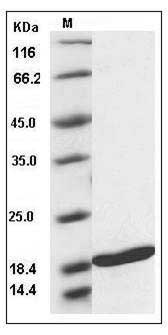-
Product Name
Human TNFSF10/TRAIL/APO-2L (CD253) recombinant protein
- Documents
-
Description
Cytokine that binds to TNFRSF10A/TRAILR1, TNFRSF10B/TRAILR2, TNFRSF10C/TRAILR3, TNFRSF10D/TRAILR4 and possibly also to TNFRSF11B/OPG. Induces apoptosis. Its activity may be modulated by binding to the decoy receptors TNFRSF10C/TRAILR3, TNFRSF10D/TRAILR4 and TNFRSF11B/OPG that cannot induce apoptosis.
-
Protein name
Tumor necrosis factor ligand superfamily member 10
-
Protein short names
APO-2L; TNFSF10; AI448571; TRAIL; APO2L; TL2; LY81; CD253; A330042I21RIK
-
Uniprot ID
Q6IBA9
-
Gene Name
TNFSF10; APO2L; TRAIL
-
Source/Expression Host
E. coli
-
Expression Plasmid/cDNA
A DNA sequence encoding the human TNFSF10 (NP_003801.1) (Val 114-Gly 281) with an initial Met was expressed and purified.
-
Protein Species
Human
-
Molecular weight
The recombinant human TNFSF10 consisting of 169 amino acids and has a calculated molecular mass of 19.6 kDa. It migrates as an approximately 19 kDa band in SDS-PAGE under reducing conditions.
-
Purity
> 97 % as determined by SDS-PAGE
-
Activity
1. Measured in a cytotoxicity assay using L929 mouse fibrosarcoma cells in the presence of the metabolic inhibitor actinomycin D. The ED50 for this effect is typically 2-10 ng/ml.
2. Measured in a cytotoxicity assay using NCI-H460 cells in the presence of the metabolic inhibitor actinomycin D. The ED50 for this effect is typically 0.2-0.8 ng/ml. -
Validations

Human TNFSF10 / TRAIL / APO-2L / CD253 Protein SDS-PAGE
Related Products / Services
Please note: All products are "FOR RESEARCH USE ONLY AND ARE NOT INTENDED FOR DIAGNOSTIC OR THERAPEUTIC USE"
